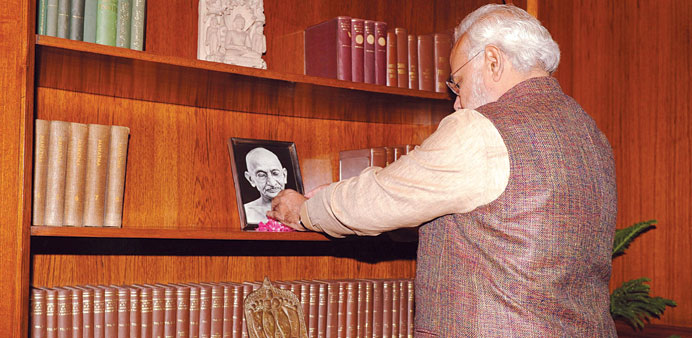Agencies/New Delhi
The first decision by Prime Minister Narendra Modi’s cabinet was made yesterday to form a special investigative team to bring back black money, funds believed to have been illegally taken out of the country to avoid taxes.
The team will be headed by retired Supreme Court judge M B Shah, Law Minister Ravi Shankar Prasad said.
He did not give the names of the other members but said they consisted of “the highest level of financial, revenue and economic management of the country.”
Estimates of the amount of Indian black money range from $500bn to $1.4tn, and one of the campaign promises of Modi’s Bharatiya Janata Party was bringing back money that had been moved abroad illegally. The establishment of the investigative team followed a 2011 ruling by the Supreme Court, which ordered an investigation into the illicit outflow of money from India.
The BJP won the recent elections, gaining a majority of parliament’s seats, and Modi and 45 ministers took their oaths of office on Monday.
On the first day, most ministers visited the offices of their allotted portfolios, some even to two-three offices, led by Modi who began with an early meeting at his South Block office.
One of the first official directives issued by Modi was to ensure best treatment for those injured in Monday’s Gorakhdham Express rail accident, besides announcing a grant of Rs200,000 to the families of each of the 25 people killed in the tragedy.
Modi himself assumed charge at 8am at his South Block office and held a meeting with his principal secretary, Nripendra Mishra, and other officials.
The Prime Minister’s Office fixed 5.50pm as the time for the first cabinet meeting. Modi then shifted to Hyderabad House for a series of meetings with visiting dignitaries from neighbouring countries who had flown in to witness his inauguration at a grand, well-attended event.
The dignitaries included Pakistan Prime Minister Nawaz Sharif, Afghan President Hamid Karzai, Sri Lankan President Mahinda Rajapakse, Maldives President Abdullah Yameen, Bhutan Prime Minister Tshering Tobgay, Mauritius Prime Minister Navinchandra Ramgoolam, Nepal Prime Minister Sushil Koirala and Bangladesh speaker Shirin Sharmin Chaudhury.
Soon after taking charge of his finance portfolio, Arun Jaitley said he was only holding additional charge of defence, and that it would be handed over to a new person once the cabinet is expanded. Jaitley also holds the portfolio of corporate affairs.
According to sources, Home Minister Rajnath Singh and External Affairs Minister Sushma Swaraj would join office today. There were also murmurs in the corridors of power that some of the alliance partners, not happy with the allotted portfolios, had asked their ministers to wait.
Among the other ministers, Ravi Shankar Prasad had to visit three offices. A lawyer himself, Prasad first visited the office of the law ministry, then Sanchar Bhavan that houses the communications ministry and later to IT department’s Electronics Niketan.
In the backdrop of the Gorakhdham Express accident, Rail Minister D V. Sadanand Gowda’s first remarks covered safety, even as his deputy, Manoj Sinha, visited the scene with his senior cabinet colleague Kalraj Mishra, who is minister for micro, small and medium enterprises.
Among others who took charge, Ram Vilas Paswan promised to ease the flow of food grain at fair price shops and curb inflation, as part of challenges posed by his consumer affairs ministry, while Oil Minister Dharmendra Pradhan focused on energy security.

Prime Minister Narendra Modi pays a floral tribute over the portrait of Mahatma Gandhi after taking office at South Block in New Delhi yesterday.
